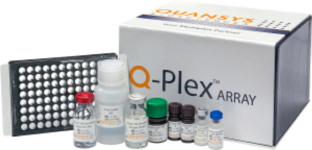Territorial Availability: Available through Bertin Technologies only in France
- Correlated keywords
- GMCSF IFN-? IFN-? IL1? IL1RA IL2 IL2R? IL6 IL6r IL8 IL10 IL12p70 IL13 MCP1 MIP1? TNF Interleukin
- Product Overview:
Cytokine release syndrome (CRS) occurs after treatment of some types of immunotherapy, such as monoclonal antibodies and CAR-T cells, when a large number of cytokines are rapidly released into the blood stream from immune cells affected by the immunotherapy. Symptoms include fever, headache, and a rapid heartbeat, but severe reactions can be fatal. The Q-Plex™ Human Cytokine Release Syndrome (16-Plex) is a fully quantitative ELISA-based chemiluminescent assay allowing the concurrent measurement of 16 biomarkers or analytes. Using only 25 µl of sample per well, up to 80 samples can be assayed for all 16 markers in the panel within 4.83 hours. The Q-Plex™ Human Cytokine Release Syndrome (16-Plex) provides researchers an easy to use and cost-effective means of generating a cytokine profile for each sample. Q-Plex plates are built by adsorbing 16 distinct capture antibodies in a defined array to the bottom of each well. Our high-quality reagents help ensure the accuracy of your results. Q-Plex™ chemiluminescent assays require analysis via the Q-View™ imaging system. See Item No. 28265 to view pricing and specifications for the Q-View™ Imager Pro or Item No. 28264 for the Q-View™ Imager LS. Species: Human Assay Type: Sandwich Sample Type: Human Serum, EDTA/Heparin Plasma Assay Length: 4.83 hours Specificity: All analytes Volume Required Per Well: 25 µl, minimum Detection Method: Q-View™ Chemiluminescent Imaging System Item No. 28264 or Item No. 28265 Multiplex Format: 96-well solid plate [Quansys Catalog No. 119733HU]
Cayman Chemical’s mission is to help make research possible by supplying scientists worldwide with the basic research tools necessary for advancing human and animal health. Our utmost commitment to healthcare researchers is to offer the highest quality products with an affordable pricing policy.
Our scientists are experts in the synthesis, purification, and characterization of biochemicals ranging from small drug-like heterocycles to complex biolipids, fatty acids, and many others. We are also highly skilled in all aspects of assay and antibody development, protein expression, crystallization, and structure determination.
Over the past thirty years, Cayman developed a deep knowledge base in lipid biochemistry, including research involving the arachidonic acid cascade, inositol phosphates, and cannabinoids. This knowledge enabled the production of reagents of exceptional quality for cancer, oxidative injury, epigenetics, neuroscience, inflammation, metabolism, and many additional lines of research.
Our organic and analytical chemists specialize in the rapid development of manufacturing processes and analytical methods to carry out clinical and commercial GMP-API production. Pre-clinical drug discovery efforts are currently underway in the areas of bone restoration and repair, muscular dystrophy, oncology, and inflammation. A separate group of Ph.D.-level scientists are dedicated to offering Hit-to-Lead Discovery and Profiling Services for epigenetic targets. Our knowledgeable chemists can be contracted to perform complete sample analysis for analytes measured by the majority of our assays. We also offer a wide range of analytical services using LC-MS/MS, HPLC, GC, and many other techniques.
Accreditations
ISO/IEC 17025:2005
ISO Guide 34:2009
Cayman is a leader in the field of emerging drugs of abuse, providing high-purity Schedule I-V Controlled Substances to federally-licensed laboratories and qualified academic research institutions for forensic analyses. We are certified by ACLASS Accreditation Services with dual accreditation to ISO/IEC 17025:2005 and ISO Guide 34:2009.





